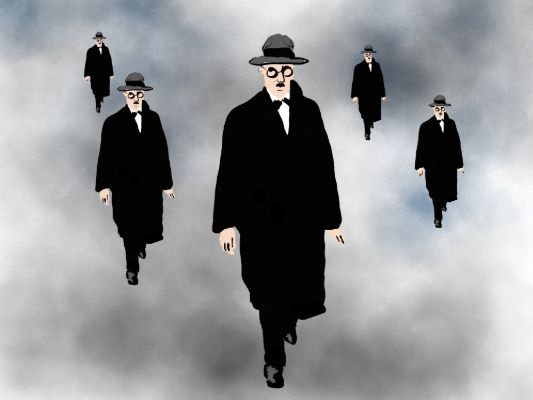One of the 20th century’s most important literary figures and a pioneer of Portuguese modernism, Fernando António Nogueira Pessoa, poet, writer, thinker and literary critic, was born in Lisbon on June 13, 1888. June 13 is the feast of St. António. St. António’s day is Lisbon’s day, and it could not have been a more appropriate birthday for Pessoa, the main writer of the city where he was born. Pessoa is more a Lisbon writer than Kafka was a Prague writer or Joyce a Dublin writer.
Both his mother and father nurtured Pessoa’s cultural development. The family lived directly opposite the Lisbon opera house. As a young boy, Pessoa may have seen several performances with his father, a passionate music critic and civil servant. Pessoa’s mother, from the Asor Islands, taught her son to read and write in Portuguese and French, and probably some English. He lost his father a month after he turned five and his brother six months later.
read more:
Tyrian purple: the lost ancient pigment that was more valuable than gold
Casablanca: A Timeless Masterpiece
In February 1896, his mother married a naval officer who was appointed Portuguese consul in Durban, South Africa. His mother’s departure to Africa with her new husband, and the possibility of Pessoa perhaps being left with relatives, undoubtedly influenced the poet to write his first poem in June 1895.
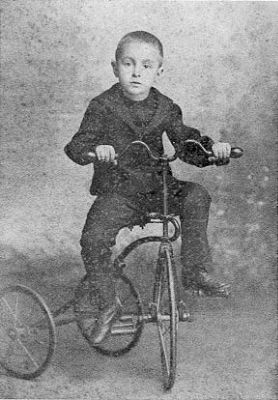
In Durban, Pessoa enrolled in a primary school run by Irish nuns. Three years later he enters Durban High School. Despite being a foreigner, Pessoa immediately distinguished himself as a bright student. In 1903, when he took the entrance exam for the University of the Cape of Good Hope, he won the Queen Victoria Prize for the Best Essay in English. But Durban does not seem to have left a deep impression on him. Among the hundreds of literary texts he wrote throughout his adult life, he never explicitly mentions Africa. Only in a poem recalling his mother’s piano playing at home in Durban the year he was to die, does he recall listening to her as she gazed out of the window at the vast African landscape illuminated by the hunting light outside.
While in Africa, Pessoa read Shakespeare and Milton, as well as the romantic poets Shelley, Byron, Keats, Wordsworth, and in prose Charles Dickens, Thomas Carlyle, Edgar Allan Poe. He received a thorough English education and thus had the opportunity to become acquainted with English literature. However, it was a year-long trip to Portugal in 1901 with his mother, stepfather and stepbrothers that introduced him to Portuguese literature. It was there that Pessoa wrote his earliest known poems in Portuguese. One of these poems was published in a Lisbon newspaper in 1902.
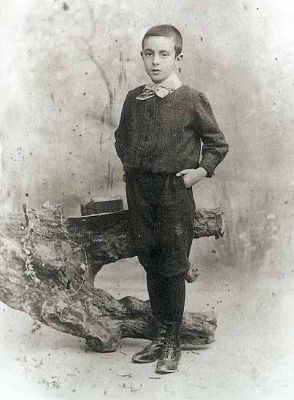
Both in Lisbon and on the island of Terceira, where he was visiting his aunt, Pessoa created a series of elaborate, made-up newspapers, which contained news, jokes, commentaries and poems written by a fictional team of journalists, some of whom he invented biographies for.
In December 1904, because of his high score in the exam, he was eligible for a government scholarship to study at Oxford or Cambridge, but he had to study the last four years in Durban. Because of a trip to Lisbon in 1901-1902, he lost his scholarship.
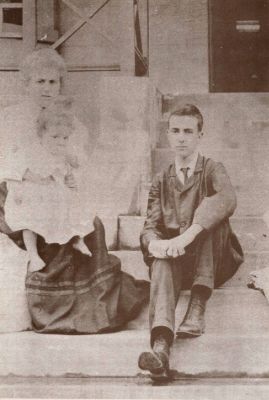
In 1905, at the age of 17, Pessoa returns to Lisbon. He studied literature at the university for about two years, then dropped out. The first year due to illness and the second year due to a student boycott, he missed exams and did not earn credits. During and after university, he spent long hours in the Portuguese National Library, studying Greek and German philosophy, world religions, psychology and Darwinian thought. In the early years, he wrote occasionally in Portuguese, more often in French, but mostly in English.
Created at the age of 15 when he returned to Durban, Charles Robert Anon was the first alter ego (imaginary persona) to appear in his poetry, short stories and essays. While in Durban, or shortly after his definitive return to Lisbon in the fall of 1905, Anon was joined by the even more prolific Alexander Search. Writing in English like Anon and supposedly born in Lisbon on the same day as Pessoa, Search, like Anon, articulates the intellectual interests and existential anxieties of a young man on the verge of adulthood.
In a letter to his close friend Adolfo Casais Monteiro, Pessoa describes his unique world as follows: “As a child I had a tendency to create a fictional world around me, to gather around me friends and acquaintances who never existed. Whether they didn’t exist or whether it was I who didn’t exist, I don’t know very well. In this, as in everything else, I must be dogmatic.”
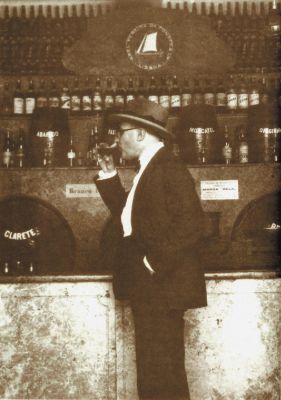
In 1909, Pessoa uses his inheritance from his grandmother to buy a printing press and opens Empresa Ibis. It was a printing house, but it closed almost immediately. In 1921 he would found the publishing house Olisipo and in 1924 the magazine Athena. During these years, Pessoa earned a living by writing or translating letters in French and English to Portuguese companies doing business abroad. He himself tried to do business as a representative of mining companies, mostly in England and elsewhere, but he was never able to make profitable deals.
Even after his return to Lisbon, Pessoa’s ambition was to become a great poet in English, and he continued to write poems in that language until a week before his death. In 1913, together with his friend Mário de Sá-Carneiro and other pioneering writers and artists, he founded Orpheu, a literary magazine that lasted only two issues and brought modernism to Portugal.
The fact that Fernando Pessoa’s surname, which means person in Portuguese, is synonymous with the Latin persona, the mask or person of the play, gives Pessoa’s poetry a coherent and interesting content. Pessoa creates multiple external identities, which he calls heteronyms. In this self-created universe, Pessoa suggests that he is the least real of all persons. These personalities created by Pessoa are thought of as alter egos, that is, Pessoa’s alter ego, or another Pessoa.
Between March and June of 1914, he creates his three most recognizable main identities: Alberto Caeiro, Alvaro de Campos and Ricardo Reis.
“I put all my power of dramatic depersonalization in Caeiro; all my intellectual discipline, shaped by the music that suited him, in Ricardo Reis; and all the excitement that I allowed to enter neither my self nor my life in Alvaro de Campos.” (Fernando Pessoa and His Companions)
Pessoa created Alberto Caeiro by saying, “One day my master was born in me”. In a letter to his friend Adolfo Casais Monteiro, he wrote: “It was on March 8, 1914, in front of a tall cabinet with drawers, I took a ream of paper (as I do on every occasion) and began to write standing up. With an enthusiasm I cannot explain, I wrote about 30 poems in a row. It was the triumphant day of my life; I don’t think I will ever have another day like it. First I gave it a title: The Shepherd of the Flocks. Immediately after that, someone I called Alberto Caeiro appeared in me.”
Alberto Caeiro is a shepherd living outside Lisbon. Caeiro was named after Pessoa’s friend Mário de Sá-Carneiro, whom he lost early. Carneiro means sheep in Portuguese. He is a poet who does not enter cities and crowds and lives barefoot in peace in the bosom of nature. Caeiro is everything that Pessoa is not, simple, wise, a pagan poet at one with nature.
I have no philosophy, I have senses…
If I speak of Nature it’s not because I know what it is
But because I love it, and for that very reason,
Because those who love never know what they love
Or why they love, or what love is.
To love is eternal innocence,
And the only innocence is not to think…
-Translation: 2006, Richard Zenith-
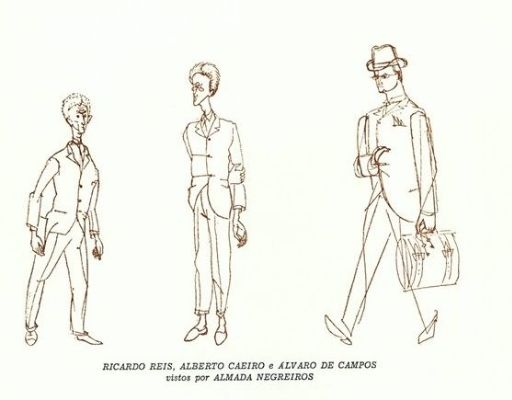
Álvaro De Campos is a Portuguese Jew, a naval engineer living in Lisbon. He is a rule-breaking mad sailor, a nihilist, a vagabond that Pessoa could never be. This fictional writer, one of the products of Pessoa’s loneliness, has an ironic approach and uses humor as a tool in his writings.
All Love Letters are Ridiculous
love letters, if love exists,
inevitably
they’re ridiculous.
but actually,
love letter only
those who do not write
It’s ridiculous.
If I could just turn around
to the days when I wrote love letters
how ridiculous it is
without thinking.
Ricardo Reis, on the other hand, is an epicurean, atheist poet, an ascetic who aims for happiness. A doctor, Reis was exiled to Brazil for being pro-monarchy.
I prefer roses, darling
I prefer roses, my darling, to the homeland
And I don’t care about fame or virtue
I like magnolias better.
I want life to flow through me
As long as it doesn’t tire me out.
As long as I don’t change.
It’s nobody’s business.
What he gained, what he lost
Whether the dawn always shines,
Every year of the leaves
Whether it blooms in the spring,
Whether it falls off in the fall.
As for the rest of the people
All that he brought to life
What does it add to my life?
Nothing, only this desire for indifference
And this half-baked trust
This is the hour of escape.
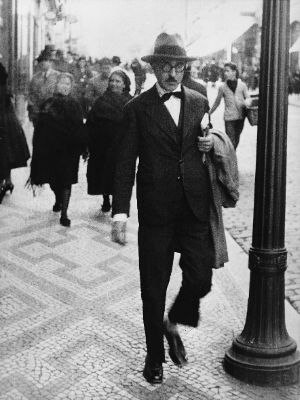
Pessoa self-published two small books of poems in English in 1918 and two more in 1921. These books received praise from English magazines.
As He Passes By
Sitting by the window,
Fogged glass from the snow,
I have a beautiful vision of her,
It passes… it passes… it passes… it passes
He threw the veil of mourning over me
Not a being of this world,
More like an angel in the sky.
Sitting by the window,
Through the fogged glass of snow
I think I see that dream, his dream,
It’s not passing… not passing.
In November 1919, 19-year-old Ofélia Queiroz is hired as a secretary at a company where Pessoa sometimes worked. She is Pessoa’s first, only and last known love. On March 1, 1920, Pessoa writes his first love letter:
“Little Ofélia, I admit that all this is ridiculous, and that I am the most ridiculous part of it. I would find it ridiculous myself, if I didn’t love you so much, and if I had time to think of anything but the pain you delight in causing me. I didn’t deserve this pain, except for loving you, and I suppose loving you is not a good enough reason to deserve this pain. Anyway…”
Ofélia describes their first encounter in the following sentences: “I remember, I was standing up; I was busy putting on my coat when he entered my workplace. He sat down in my chair, put down the lamp, turned to me and suddenly began to declare his love, as Hamlet did to Ofélia: Ah, my dear Ofélia! I can’t craft my verses, I have no art to measure my sighs; but I love you very much. Ah! Infinitely, believe me.”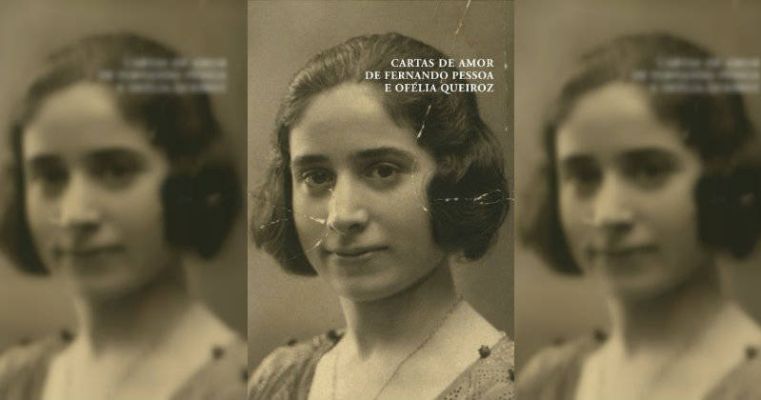
In addition to writing letters to each other, they meet and go for walks. In a letter dated November 29, Pessoa ends his relationship with Ofélia.
“The time that ages faces and hair also ages violent emotions, but more quickly. Because most people are fools, they manage not to realize this, and they think they still love where there is nothing left but habit. (…) These things cause pain, but the pain passes. If even life, which is everything, passes away in the end, how can love and pain and all the other things that are nothing but moments of life not pass away? (…) My love has passed away.”
When Pessoa reunited with his beloved after 9 years, he would say: “In the place of exile within me, your letter reached me like the happiness of a distant home…”. Ofélia would say the following about Pessoa years later: “He was neither passionate nor vain. He was simple and honest. He used to tell me, don’t tell anyone that I am a poet, I write poetry at most.”
Álvaro De Campos, one of the external identities she creates, is sometimes involved in Ofélia and Pessoa’s relationship. Ofélia expresses this situation as follows: “For example, Fernando was sometimes incomprehensible, especially when he appeared as Álvaro de Campos. Then he would say to me: “Today, I didn’t come, my friend Álvaro de Campos came instead…” Then he would behave in a completely different way. He would get restless, say nonsensical, incoherent things. One day he came to me and said: “I have a request for you, madam, and that request is to put Fernando Pessoa’s vile face upside down in a bucket of water.” And I replied: “I hate that Álvaro de Campos, I only love Fernando Pessoa.” Then Fernando said, “I don’t understand why he loves you so much.”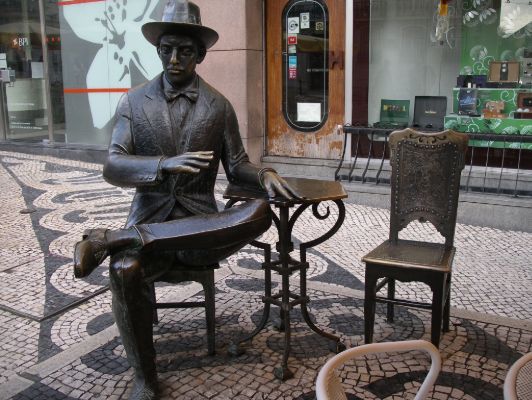
His masterpiece The Book of Restlessness was first published in 1913, and various parts of it were published in 1929. In this work, a new personality emerges. Bernardo Soares, an accounting assistant living and working in Lisbon. Of all the identities he creates, he is the most similar to Pessoa. After his death, Pessoa left behind more than five hundred chapters of this work, many of them scattered among his papers and notebooks. It will be 1982 before the first edition of The Book of Restlessness, compiled by experts, is published.
With The Book of Restlessness, a lyrical and metaphysical diary, Pessoa creates Bernardo Soares, who has an important place in the literary world, and through this fictional character he reveals the subtle fiction of his autobiography. The book can be called a philosophically profound, simple, poetic novel, a diary, or perhaps a prose poem.
“To live is to be someone else. And if one feels today as one felt yesterday, it is impossible to feel. To feel today what was felt yesterday is not to feel, it is only to remember today what was felt yesterday, it is to be the living corpse of yesterday’s life that is no more. To erase what is on the blackboard from evening to morning, to wake up every moment with a resurrected excitement, every dawn renewed, to know how to be or to have, to exist or to have in our imperfect state, for that alone it is worth it…
“What a fatigue it is to be loved, to be truly loved! How exhausting it is to become the burden of someone else’s excitement! To turn a person who has always wanted to be free into a burden of responsibility. To respond to certain emotions, to show the courtesy of not acting distantly, just so that others do not think that we are pretending to be a prince of excitement, that we do not want to accept the maximum that the human spirit can give. How exhausting it is to feel that our existence is captive to our relationship with someone else’s emotions! How exhausting it is to feel something one way or another, to have to love a little bit, without even finding a complete reciprocation in reality…”
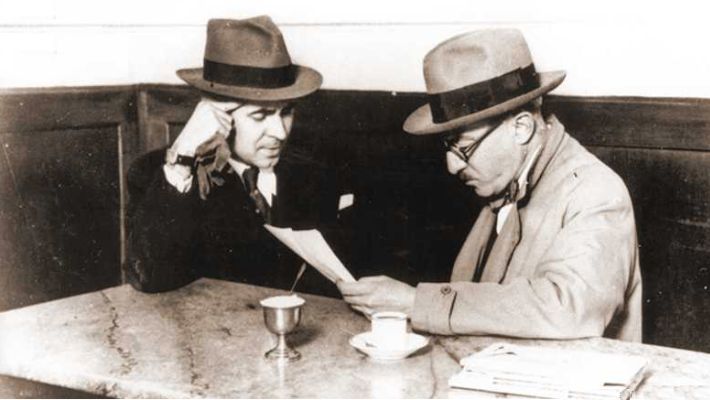
Pessoa maintained close relations with his relatives, living with his aunts in his youth (when he was not living in rented rooms) and with his mother and half-sister when they returned from South Africa in 1920 after the death of his stepfather. Pessoa was also attached to his friends, mostly from literary circles, with whom he met regularly in Lisbon cafés. But both with his friends and with his family, Pessoa steadfastly defended his private life.
An interesting aspect of Pessoa is that he read horoscopes for friends, family members, historical and cultural figures, and for himself. He read many books and wrote hundreds of pages on mysticism, on hermetic traditions such as the Kabbalah, the Rosicrucians and Freemasonry, on theosophy, alchemy, numerology, magic and espritizism. This interest in the occult sciences, combined with Pessoa’s patriotic tendencies, gave rise to what he called mystical nationalism.
“I have no social or political feelings, although in a way I am very nationalistic. My nation is Portuguese. As long as my peace is not disturbed, I don’t care if Portugal is conquered or occupied. However, I do not hate those who write bad Portuguese, (…) I hate the badly written page itself with real hatred, the only hatred I feel.” (The Book of Unrest)
Pessoa actively participated in the social and political life of his time, but expressed his position in writing. In 1935, when the dictator Salazar’s regime passed a law banning secret associations such as Freemasonry, he published a passionate essay. In 1934, Pessoa was awarded the Antero de Quental Prize for Mensagem (Message), the only book of poetry published in his lifetime, but he did not attend the ceremony presided over by Salazar. In his speech at the ceremony, Salazar instructed the writers that their creative and intellectual work must not only respect certain limits, but also certain fundamental principles prescribed by the New State’s moral and patriotic principles. Pessoa, who did not attend the ceremony but read the speech in the newspaper, was outraged and wrote anti-fascist poems.
The poetry of his last year reflects a growing loneliness. On November 28, 1935, Pessoa was hospitalized with a fever and severe abdominal pains. The next day, he writes his last words in English: “I don’t know what tomorrow will bring.” On November 30, 1935, at the age of 47, he dies of cirrhosis.
Hit the Road! Losing Countries
Hit the road! Losing countries!
Becoming someone else indefinitely,
To live only to see
To be a rootless soul!
Belonging to no one, not even to myself!
To go on and on, without end
In pursuit of an absence
And he wants to reach her!
1933
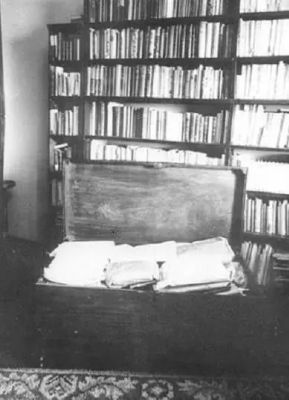
Pessoa is a writer few people knew when he died. We owe our knowledge of Pessoa to the Italian writer Antonio Tabucchi, until his sister found a trunk of documents in his house. Tabucchi translated Pessoa and wrote essays on Pessoa. Tabucchi, who devoted a significant part of his life to the recognition of Pessoa, tells the story of the poet’s last three days before his death in his book The Last Three Days of Fernando Pessoa.
The identities that Pessoa created during his lifetime came to see the bard on his deathbed, talking about themselves and their creator. However, we owe the truth of Pessoa to the more than twenty-seven thousand documents found in a trunk opened by his sister. These bear the signatures of poets and writers that Pessoa fictionalized. Poems, criticism, philosophical texts, novels, plays, horoscopes, letters, interviews…

